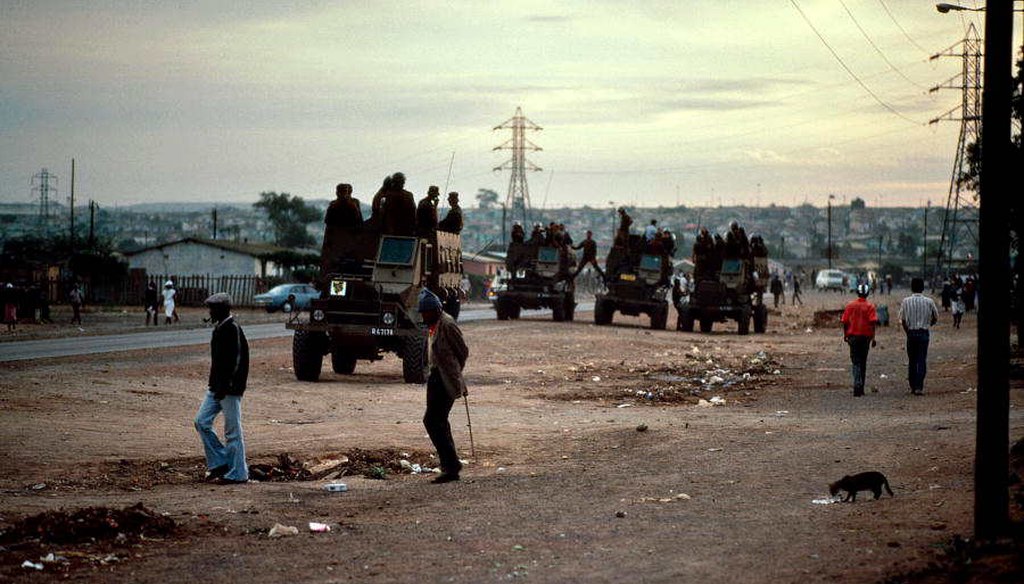

Our only agenda is to publish the truth so you can be an informed participant in democracy.
We need your help.


A South African army patrols Port Elizabeth in 1985 during apartheid. (UN Photo)
The primary debate over race in this country seems to be whether the country needs to have a debate at all. Polls show white and black Americans have markedly different views of where the problems lie.
New York Times columnist Nicholas Kristof has written a series of articles called "When whites just don’t get it." Kristof applauded the progress in race equality America has achieved, but he basically argued that whites don’t know what life is like for blacks, and he presented many stats to show that great inequality remains.
Comedy Central’s The Daily Show aired video of Kristof making his case Dec. 4.
"The United States right now incarcerates more African-Americans as a percentage than apartheid South Africa did," Kristof said in the clip.
Numbers on the American side are easier to come by and are straightforward.
Kristof cited an Aspen Institute report that said, "The United States imprisons a larger percentage of its black population than South Africa did at the height of apartheid."
The U.S. Bureau of Justice Statistics reported that, in 2010, the incarceration rate for black men in all of the country’s jails and prisons was 4,347 people per 100,000. For whites, the rate was 678 people per 100,000. America imprisons people far more in general than comparable countries. Among the Organization for Economic Cooperation and Development nations, the United States is the clear leader with an incarceration rate about two and half times higher than the second place country, Chile.
Precise numbers from South Africa during the apartheid years are more elusive.
As a refresher, apartheid was South Africa’s policy of strict segregation and differential treatment of people according to their race. It became fully part of South African law in 1950 with passage of the Population Registration Act. That law dovetailed with other bills to anchor race-based controls. For instance, the Lands Act set aside about 87 percent of property for whites, and the Group Areas Act forbid nonwhites from living in white-designated zones. The 1950 legislation involved a set of "pass laws," so called because they created an internal passport system that supported the forced segregation.
The apartheid era lasted more than 40 years, ending in 1991 with the repeal of the apartheid laws.
William Worger, professor of history at the University of California-Los Angeles, is a longtime researcher of the apartheid era. Worger said the pass laws did much to fill the prisons.
"Most of the arrests and imprisonment in South Africa were for pass laws offences," Worger told PunditFact. "The incarceration rate in South Africa in 1984 -- the midst of apartheid -- was 440 persons imprisoned per 100,000 population. Blacks comprised around 94 percent of those incarcerated."
Based on Worger’s numbers, that would translate to an imprisonment rate of 612 per 100,000 for blacks in 1984.
A report from the advocacy group The Sentencing Project found an incarceration rate of 851 black South Africans per 100,000 in 1993 (two years after the end of apartheid). The figure tracks back to a 1993 report of the South African Correctional Services. The report combined the categories of "black" and "colored" to produce the black male rate of incarceration.
That’s two snapshots over a span of a decade, but it’s the best we have. In both cases, the numbers don’t begin to approach the current U.S. incarceration rate of African-American males.
Whatever the limits in these data, the relative numbers for South Africa and the United States hold up, simply based on the number of beds in the South African prison system. In 1992, according to a report by University of Cape Town researchers, the country housed about 109,000 inmates in space designed for about 88,000. While overcrowding was known to have been worse before 1992, the black imprisonment rate could not have come close to today’s American rate simply due to limited room.
There’s something of an international theme in countries comparing themselves to apartheid South Africa. We found Australian journalists drawing the same contrast relative to rates of imprisonment in their country.
Our ruling
Kristof said that America puts African-Americans behind bars at a higher rate than South Africa did under apartheid.
Based on the known evidence, that appears to be correct. In 2010, the black male incarceration rate in the United States was 4,347 people per 100,000 in the United States. That comes nowhere close to reported incarceration rates of blacks in South Africa during and immediately after the apartheid era.
We rate the claim True.
Comedy Central, The Daily Show, Dec. 4, 2014
New York Times, When Whites Just Don’t Get It, Nov. 25, 2014
Aspen Institute, Race Crime and Punishment: Breaking the connection in America, 2011
World Factbook of Criminal Justice Systems, South Africa, 1993
Pew Research Center, Incarceration gap widens between whites and blacks, Sept. 6, 2013
Bureau of Justice Statistics, Correctional Populations in the United States, 2010, December 2011
Statista, Incarceration rates in OECD countries, 2012/13
Human Rights Watch, Prison conditions in South Africa, February 1994
Republic of South Africa, Population of South Africa, by group
Prison Policy Initiative, Global comparisons: U.S.-South Africa
Sentencing Project, The International Use of Incarceration - 1992-1993, September 1994
New York Times, South Africa Scraps Law Defining People by Race, June 18, 1991
American Journal of Sociology, Black-White Wage Inequality, Employment Rates, and Incarceration, September 2005
Pew Research Center, Incarceration gap widens between whites and blacks, Sept. 6, 2013
Email interview, William Worger, professor of history, University of California - Los Angeles, Dec. 9, 2014
In a world of wild talk and fake news, help us stand up for the facts.
